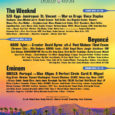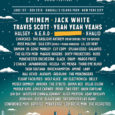HOW MUSIC GOT FREE
WARNER BROS./UNSCRIPTED TELEVISION/TELEPICTURES/SPRINGHILL/INTERSCOPE FILMS/SHADY FILMS/MTV ENTERTAINMENT STUDIOS
JUNE 11, 2024
Produced by Eminem (Marshall Matheres), LeBron James, Maverick Carter, Paul Rosenberg and Steve Stoute, How Music Got Free is a two-part docu-series streaming via Paramount+ that details the economic factors that have guided the music industry through the digital age. Narrated by Method Man, the documentary seeks to examine the fascinating shift we have seen within the music industry and the consequences it poses on art and how it is valued. Artists, such as Eminem, 50 Cent, and Timbaland, alongside industry figures like Jimmy Iovine, Stoute, and Rocsi Diaz are prominently interviewed, giving How Music Got Free a level of insider credibility to support its shocking narrative.
Episode one of How Music Got Free looks at how the innovation of the CD initially led to a significant boom within the industry, one that would, unknowingly, open the floodgates of online piracy and filesharing networks. In such, How Music Got Free not only makes the process of filesharing accessible as a means of establishing the necessary context for the series, but also interviews a number of those involved within some of the most notorious piracy networks. Such firsthand accounts provide a level of range to the perspectives presented in the series.
The second episode continues by looking at the rise in online piracy amid a deafening level of inaction from the music industry and the Supreme Court. Despite this, the episode follows the FBI’s investigation in an attempt to halt digital piracy. In this, How Music Got Free takes a unique position in that it balances criminal investigation alongside the sentiment of technological innovation that would see the industry pivot away from individual ownership towards collective streaming. For better or worse, the impact of piracy extended far beyond album sales, but sparked a generational shift towards the value of music, something that is perhaps debated far more extensively today than it was in the early 2000’s.
There is a hint of true crime which illuminates the compelling story behind How Music Got Free. Hearing from figures on both sides of the piracy war of the late ‘90s and early aughts is not only incredibly engaging, but allows for the audience to see the consequential nature of the narrative, outlining the death of the CD, while simultaneously ushering in the digital age of the music industry. The economics of this period would forever change not only how we consume music, but all aspects of the relationship between artists and labels. While the series comes to a close before streaming would truly catch on, it would be interesting to see a second documentary follow where How Music Got Free left off to better demonstrate how the streaming age has further shifted this narrative. At its core, How Music Got Free is a statement on the value of art in a time of massive commodification, while intersecting with countless social, economic, and cultural factors, making for an essential series to better understand the modern music industry.









